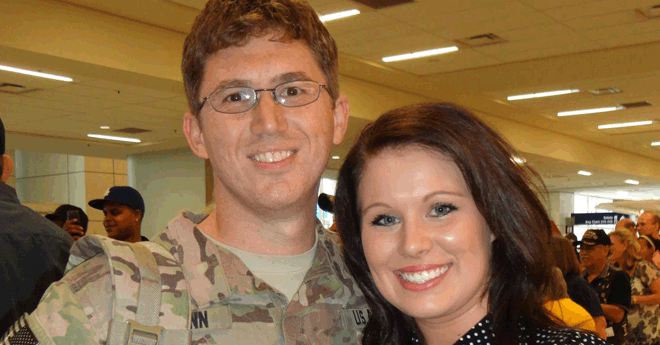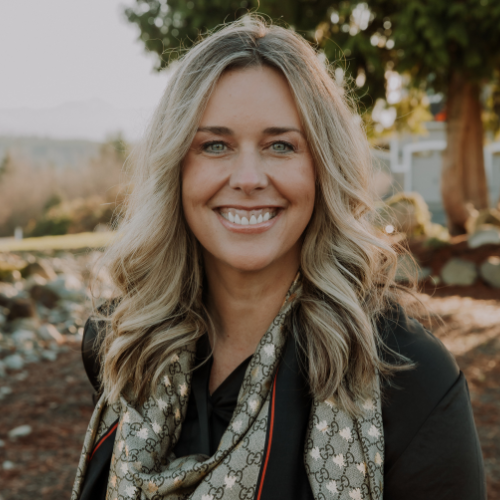TILLMAN TUESDAY: Military Widow Nikki Altmann Continues to Live Life While Helping Others
Pat Tillman Foundation can’t fulfill its mission to empower military veterans and their spouses without the generosity of our supporters across the country. Nationwide, nearly 350 Tillman Scholars are striving to impact our country and communities through their studies in medicine, law, business, policy, technology, education and the arts. Every “Tillman Tuesday,” we are committed to highlighting the individual impact of a Tillman Scholar, focusing on their success in school, career and community—all thanks to your support.
On December 25, 2011, Tillman Scholar Nikki Altmann’s life changed forever when she received the news that her husband Joe had been killed in action while serving his country with the United States Army. Now a military widow, Nikki is fulfilling her husband’s wishes and continuing to live life while helping other Gold Star family members while she is currently enrolled at Texas A&M. In this week’s edition of Tillman Tuesday Nikki shares how she keeps her husband’s memory alive and how she plans to help other military families with her college degrees.
All too often we hear of the soldiers deploying and heading off to foreign places to defend our freedom but not enough do we hear of their loved ones left behind who are also a pivotal part of the deployment. Explain what it’s like to be a military spouse and what the toughest part was.
“My husband and I were never able to live together because of my job, I was constantly traveling and he was on base. The only time I heard about the lifestyle of the military is when my friends went through it. Training exercises were tough because you never knew where they were on missions. I felt I always knew I had to be strong and continue to take care of things at home. It takes perseverance, someone strong to be a military spouse and keep a smile on your face even if that’s not how you’re feeling inside. You spend the majority of your time moving, deploying, and meeting new people, and I was gone a lot with my job so I was used to it.”
How did you and your husband Joseph meet, and who asked who out on a date first?
“At the time I was a flight attendant and my good friend from high school was stationed in Hawaii so I went to visit. When she picked me up, she mentioned she had invited a few of her husband’s friends from his unit to their house. As I was meeting people and socializing, I went into the kitchen to get something and he was there cooking. I introduced myself and we started talking and he asked me if I wanted to help so we cooked Shrimp kabobs together. He made me peel the shrimp (which I had never done before) so we were both laughing because they were slimey and I had never peeled them. The next day a group of us went to the beach together and hung out for the entire week I was there. The rest is history. Right before I left for the airport to leave Hawaii I asked him a few questions, ‘Do you want to be married someday? How do you feel about a long distance relationship?’ I don’t beat around the bush so I just asked him out. I wanted to make sure we were on the same page. A year later he proposed over Skype. I was in Ireland for work and he was in Hawaii preparing to deploy. It was the funniest thing how he did it. A few days later when I landed in Hawaii he formally proposed in person.”
What kind of person was your husband? Tell us about his best quality.
“He was very quiet and always had a book in his hand. Whether the book was about learning to speak Korean or how to become a Taxidermist, fictional, science…he loved to read. He was also really big on outdoor activities. Quiet, but a great sense of humor at just the right time. He never missed a beat!”
Christmas Day for a lot of Americans is a day of celebration and life. Unfortunately Christmas Day in 2011 was the opposite for you and your family. How do you or did you move forward and “celebrate” that day since?
“Every Christmas my parents and I used to spend the day cooking and now I just cook all day to keep myself busy and get through the day. We don’t really celebrate Christmas. This year we tried to put up a tree and after two hours we took it down. Putting up a tree was the last thing Joe and I did together while he was on R&R. We set a place for him at the dinner table and lit a lantern to remember him. Joe’s best friend Chris was stationed in Alaska and we coordinated a Chinese Lantern lighting with him. Every year I try to make it a good day. I have a god daughter and god son and I want it to be fun for them.”
You made mention in an article, published late last year on the topic of military widows, that you ‘want to turn tragedy into something triumphant, honoring our soldiers by living our lives.’ How are you living your life now for your late husband Joseph?
“I do things that he wanted to do, like rock climbing. He was big on outdoors so I try to do things outside as much as I can. Things that he normally wouldn’t have done, I’ll go and try to go out and live life as much as if he were here living with me today. One of the hardest things is that you go from two to one; I don’t have my partner physically, but I know he’s with me.”
How did being named a Tillman Scholar change your life? What was it like to receive the call that you had been one of 60 individuals selected?
“I cried when I got the call, I didn’t think I deserved it. I had read stories from previous scholars and read about all of their accomplishments. Those stories were about huge goals, but for me personally I just wanted to change a policy with paperwork. So when I was first told I was selected it was a shock. I remember thinking it was such an amazing honor and I’m so grateful for this opportunity.
I have my class picture blown up hanging on my wall. It keeps me going every day. Hopefully one day soon we (fellow Tillman Scholars) can work together and we can change things for this country and our communities. It’s such an honor that the Pat Tillman Foundation wanted to support me and what I believe in and the best way for me to say “Thank you” to the PTF is for me to succeed and make what I want to happen become a reality. It’s not about the money, it’s about the connections you make and the support team.”
You are currently enrolled at Texas A&M at the College of Education and Human Development. What do you plan to do with your new career?
“Right now I work in the Veterans Service office and help process benefits for students to make sure they’re set up and ready to go to college. After I graduate, I’d like to work in D.C. for a nonprofit or the VA, but I am keeping my options open. I’d like to start a program that educates soldiers and families on what all the military paperwork and information means. Right now, soldiers have to change their benefits manually, so we want to help make the process of benefits a lot smoother and more efficient than it is now.”
You’re not just a student on campus. You’re an actively involved student, starting the Aggie Gold Star Network. Explain what the network is about and the feedback you have received from those involved in the network. “It’s a means to connect the Gold Star families within Texas A&M and also connect with others in the communities. Right now I’m trying to get through the red tape to make it a non-profit. In the network, we just talk about how we were notified about our loved one, how things are going at A&M, etc. So far, I’ve been able to connect Gold Star family members with tutors, realtors and new friends.”
What advice would you give military spouses whether it’s about deployment support, answers to the ‘what if’ questions, or their transition after deployment?
“For me, I am the ‘what if’. I’ve had many of those conversations with friends whose soldiers are ready to deploy and I tell them to keep it in mind but don’t harp on it. Be strong with your faith if that is what carries you through, connect with friends and family to help you through the tough times. It’s also important that when your soldier returns, to ease them in back to the reality and the routine you’ve been doing. Be there, be supportive and keep them involved. PTSD is not something to joke about and it’s important to be there for your spouse and listen to them. Deployments are never easy, no matter how long they are, but have an open mind for communication and make sure you have a support system, no matter who it is.”
How do you continue to keep your husband’s memory alive?
“I talk about him when the time is right, if the time is right. The more I bring him up, the more receptive people are to understanding what I’m going through and it doesn’t freak people out as much. Talking about him helps keep his memory alive. ‘There was a soldier, his name was Joe, and he died for us.’ Whenever I talk about him and people say, ‘he sounds like a really cool person’ and that’s the impression of Joe I want to leave people with.”
What’s next for Nikki Altmann?
After I graduate (Dec. 2016) with my Bachelor’s Degree, I plan to apply for the Texas A&M Master’s program for Master of Public Service and Administration at The Bush School. I remember the obstacles and processes I went through to get where I am today, and I want someone to one day look at me and say ‘because of you I achieved X.’ I want other widows to see that they too can do it.”



